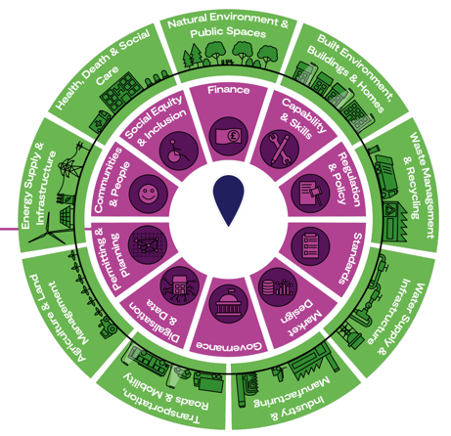Navigating net zero for local authorities
Supporting innovation adoption for local authorities
The Net Zero Innovation Adoption User Journey Framework is a practical roadmap designed to guide individuals and organisations on their journey towards adopting innovations and technologies to support their wider net zero objectives. Many local authorities struggle to navigate the complexities of adopting new innovations for net zero, unsure of where to start or how to proceed. The Net Zero Innovation Adoption User Journey Framework seeks to change that.
Understanding the Net Zero Innovation Adoption Framework
Resources for local authorities and the public sector
This guide provides detailed advice relevant for local authorities and the public sector for each stage in the user journey framework, and signposts additional resources to improve understanding and address challenges faced.
-
Info
Additional resources
The initial stage marks the beginning of the Local Authority’s journey to adopting net zero solutions. Here they become aware of the challenges they face, and identify the areas under their control that need to be addressed in order to achieve net zero. This could cover areas such as:
- Fleet
- Estates
- Utilities/Energy
- Construction
- Infrastructure
- Procurement/supply chain
- Public transport
- Waste Management
There are both technical and non-technical barriers to the transition to net zero. Local authorities will need to take a systems-based approach to understanding the complexity of the challenges they face. The Net Zero Living programme has developed a schema to represent the physical and social systems that interact within a place to create the unique challenges and opportunities that local authorities face when transitioning to net zero.

This schema represents the various factors, including social systems, physical systems and infrastructure, that interact with each other within each place. The complexity that this web creates leads to technical barriers to a smooth and just transition to net zero. Find more explanation and a detailed exploration of the Net Zero Living programme.
Reflective questions:
- Which sectors within your remit contribute the largest proportion of carbon emissions?
- Are we fully aware of the net zero challenges to our local authority?
- What additional information or expertise do we need to fully grasp the challenges we face in achieving net zero?
- Where in our operations could we make greatest impact for emission reduction?
- How do physical and social systems interact in our place, and what barriers might this cause?
- The Net Zero Living team at Innovate UK Business Connect have created a systems thinking guide, and support regional authorities and businesses accelerate the transition to net zero.
- Innovate UK Business Connect hosted a webinar series called Net Zero Talks. Over 5 episodes, it covers the challenges and opportunities for local authorities, decarbonising buildings, electric vehicle infrastructure, collaboration with academia, and common challenges.
- Local Government Association have commissioned a report from WPI Economics, Delivering Local Net Zero, to investigate the key areas that councils have significant influence over to reduce carbon emissions. It provides the case for how and why councils can unlock economic, social and environmental value through various low carbon projects, and the associated co-benefits.
-
Info
Additional resources
At this second stage, the local authority can explore the potential options available towards adopting net zero solutions for their specific challenge areas. This could involve exploring current funding opportunities to identify the most cost-effective options, as well as engaging with other local authorities to learn from successful projects or technologies in other similar contexts.
Reflective Questions:
- What funding is available for net zero solutions among identified challenge areas?
- What local strengths and opportunities exist which can support net zero innovation adoption?
- Who are the key stakeholders or collaborators we should engage with to support our journey?
- Innovate UK Business Connect have published guidance on accessing local net zero investment. This covers private capital required for local net zero projects and how to unlock it.
- Innovate UK Business Connect’s Net Zero Places Innovation Network aims to make Net Zero in the UK a reality. We do this by supporting local/regional authorities and agencies to connect, collaborate, inform, share experiences and lessons learned, to support organisations across the UK.
- Innovate UK KTN Net Zero Places Innovation Network and the Greater South East Net Zero Hubs (funded by BEIS) delivers a webinar series on Heating for Net Zero – Decarbonisation of Buildings and Estates. This series answers the most common questions from local authorities around decarbonising buildings and estates. These one-hour long events aim to help and guide local authority officers who have the responsibility to meet net-zero and want to hear how other authorities have approached their net-zero challenges.
-
Info
Additional resources
Evaluation is a systematic assessment of the design, implementation and outcomes of an intervention. In order to do this, local authorities should conduct a thorough assessment of the feasibility of various net zero solutions, focusing on those that are financially viable and practically achievable. This includes evaluating the technical requirements, economic viability, and regulatory considerations to determine most suitable to address net zero innovation adoption challenges. This also includes consideration of the constraints in the procurement process, and how they might be addressed.
Preliminary market engagement may be a useful tool for local authorities to utilise the expertise of SMEs and gain market expertise from the potential supply chain. IPEC’s guide to pre-market engagement provides practical advice on becoming an informed client and capturing innovative solutions to achieve more sustainable outcomes.Reflective Questions:
- How do we evaluate the potential of different net zero solutions?
- Are there specific risks or barriers that could impact the successful implementation of net zero solutions within our organisation or community?
- What can we learn from other similar projects in other contexts?
- PWC, commissioned by Innovate UK Business Connect, published a Market Intelligence Report on Local Net Zero Projects, and providing guidance to investors and lenders looking to invest in the UK’s green economy.
- Innovate UK Business Connect’s Innovation Canvas is designed to help you create value from innovation and identify the changes needed to make your idea succeed. It provides a framework for assessing the strengths and weaknesses of a specific project, identifying the most urgent challenges to overcome, and prioritising what action to take.
- The Local Net Zero Hubs programme helps local authorities and communities in England to play a leading role in decarbonisation, supporting local authorities to develop net zero projects and attract commercial investment. Find out more on the GOV.UK website.
- Local Government Association provides tools to understand the costs and benefits of retrofitting fuel poor households and of encouraging active travel.
-
Info
Additional resources
Typically, this stage involves organisations initiating trials, research and development such as pilot projects to test the feasibility and performance of solutions in a controlled environment. This stage allows for the collection of empirical data, identification of scalability factors, and discovery of any unforeseen challenges or opportunities.
Although this is more challenging under public procurement regulations, a direct award can be justified when procuring a prototype or other novel good or service that is designed or developed at the request of the contracting authority. As such, it is possible for the local authority to trial a net zero innovation through a pilot project.
In some cases (see UKAEA example in IPEC Playbook), innovation partnership processes have been used to iteratively develop suppliers proposals for innovative solutions, with initial contracts awarded for developing detailed concept designs. The most promising are extended for further development in order to find the most suitable design. The supplier with the most suitable design is then contracted to carry out the works.
Alternatively, the local authority could use market research and evidence from projects in other similar contexts to establish the feasibility and performance of net zero innovations, if a direct award is not possible in certain situations.
Reflective Questions:
- What new technologies and practices should the local authority consider trialling?
- Should we undertake a pilot project, or use a different approach to assess feasibility?
- What potential risks or barriers should we anticipate during the pilot phase, and how can we mitigate them?
- How can we involve key stakeholders in the trial process?
- If undertaking market research, where else has a similar solution been trialled or adopted, and how successful was it?
- The Net Zero Living Team at Innovate UK Business Connect produced a series of webinars on public procurement for net zero. One in particular covers topics like pre-market engagement and challenge-led procurement, which are especially useful in the trial stage of any innovation.
- Innovate UK Business Connect have created a UK On-Street Electric Vehicle Charging directory, which showcases the organisations who can provide directions towards funding, collaborations or partnerships, local or regional support, and useful resources and case studies.
- Enabling Smart Local Energy Systems is a programme run by Innovate UK Business Connect. This resource lists a range of projects from demonstrator phase to detailed design and concept phase, which could be used to guide the direction of a trial project.
- The Innovation Procurement Empowerment Centre (IPEC) have created a guidance document called Unlocking Innovation in Public Procurement: A Practical Guide to Pre-Market Engagement. This guide demonstrates how Preliminary Market Engagement (PME) can diversify the supplier base by engaging SMEs and new entrants, capture cutting-edge innovations, foster buyer-supplier collaboration for mutual value creation, and mitigate risks by refining procurement requirements early in the process. IPEC have also authored the Procuring Innovation Playbook, which gives guidance on innovation pilot projects, and specifically covers pilot projects in the public sector.
- LocalGov is a website that hosts case studies of local authority projects across a range of sectors, including Net Zero, providing an opportunity to identify successful projects in other similar contexts.
-
Info
Additional resources
At this critical stage, local authorities use the lessons learnt from the trial stage to affirm their commitment to integrating net zero innovations into their operations. This involves developing a detailed roadmap outlining specific objectives, timelines, resource allocations, and stakeholder responsibilities. This roadmap serves as a guide, ensuring a structured approach towards successful integration.
Reflective Questions:
- What support networks and initiatives can we engage with to support our adoption efforts?
- Will the adoption of this innovation require additional resource?
- Can the supplier/contractor who received a direct award contract for the trial phase also provide the scale-up?
- How can our identified solution be adopted into business as usual?
- Innovate UK Business Connect have produced a series of webinars on Net Zero Living: Procuring for Net Zero, with recordings freely available to watch. Topics covered are wide-ranging and will benefit multiple steps in the user journey framework. Topics include Key enablers of creating value through procurement; Real-world case studies from public sector; The importance of pre-market engagement; Challenge-led procurement; Pre-commercial procurement of innovation (Contracts for Innovation); How to use a framework and a dynamic purchasing system, and how they can advance progress towards decarbonisation targets.
- The Cabinet Office has created guidance on the Direct Award process in public procurement. The direct award process allows a local authority to award a public contract without a competitive tendering procedure, allowing the local authority to choose the supplier that meets their project needs.
- Transport for West Midlands had a successful pilot of a sustainable transport strategy, mobility hubs, which include EV charging points, secure cycle parking, walking maps and public green space. The pilot was successful, so the mobility hubs are now being rolled out across the region.
- The UK Governments local electric vehicle infrastructure (LEVI) fund supports local authorities in England to work with the chargepoint industry, to improve the roll out and commercialisation of local charging infrastructure.
- Local Government Association also hosts a sustainability programme, which provides tools and opportunities to build councils’ capability and capacity in sustainability and the environment. This includes a searchable database of sustainability and climate change case studies.
-
Info
Additional resources
Once the commitment is made in the adoption stage, local authorities transition to implementation. Here, they turn plans into action by deploying projects at scale and further integrating them into existing systems and processes. This involves actively monitoring key performance indicators and adjusting as needed to optimise the benefits of net zero innovations for achieving sustainability objectives.
Reflective Questions:
- How will we measure the success of the implementation project?
- What systems or processes should be in place to monitor and optimise the performance of net zero solutions during implementation?
- How can we effectively integrate net zero solutions into our daily business practices?
- The Bee Network by Transport for Greater Manchester is an example of a project where net zero innovation is being successfully integrated across a region, and across rail, road, and active transport options.
- HM Treasury have produced the Magenta Book, which provides guidance on evaluation in government: its scoping, design, conduct, use and dissemination as well as the capabilities required of government evaluators. It provides guidance on how to incorporate evaluation through the design, implementation, delivery and review stages of policy making. It also explains how results can be interpreted and presented, and what should be considered in this process.
- UK Green Building Council have produced guidance on the levels of building performance expected for net zero claims, to support the evaluation of the success of any built environment-based net zero projects.
- Local Partnerships have developed the Greenhouse Gas Accounting Tool to provide a straightforward and consistent approach for councils seeking to calculate their own carbon baseline. This will help councils evaluate the success of any net zero innovations by providing a baseline and the opportunity to re-measure.
-
Info
Additional resources
In this phase, the local authority seeks to scale up the adoption of net zero technology and share knowledge and best practices with others in the sector. For local authorities, this may take the form of disseminating the adoption from one to multiple of the local authority estates/functions, collaborating with other local authorities, or collaborating with other businesses or public sector organisations who are interested in adopting similar innovations.
This may involve developing case studies, hosting workshops or webinars, and participating in forums to facilitate knowledge sharing and collaboration.Reflective Questions:
- How can we effectively communicate our successes and lessons learned to others in the industry?
- What are the opportunities for partnership and collaboration to accelerate the diffusion of net zero innovation?
- UK Power Networks have created six ways that local authorities can share information on their decarbonisation plans.
- Local Net Zero Hubs provide a space not only for accessing support and funding, but also for knowledge sharing within regions. There are Net Zero Hubs for North East & Yorkshire, North West, Midlands, South West, and South East.
- Local Government Association hosts the climate emergency knowledge hub where councils and partners who have declared a climate emergency, or made any other type of commitment to reduce carbon and improve the environment, share information and experiences. This includes virtual events and roundtables designed to promote sustainability practice happening in council across England. They also offer the opportunity for councils to share their projects as a case study within a database by using a case study form.
-
Info
Additional resources
The final stage involves ongoing efforts to drive innovation and improvement in net zero solution integration. It includes activities such as gathering feedback from employees, departments and users, monitoring performance metrics, and exploring new technologies or approaches to optimise and enhance net zero solutions.
Reflective Questions:
- How can we collect and leverage feedback and data to identify areas for improvement in our journey towards net zero?
- What continuous improvement processes can we implement to maintain our sustainability progress?
- How can we stay informed of new developments?
- Net Zero Go is run by Energy Systems Catapult, funded and backed by the Department for Energy Security and Net Zero. It is available for all UK local authority teams working on local Net Zero energy projects, from renewable energy generation to heat, from transport to building decarbonisation, and more. It includes case studies, step-by-step guides and a discussion forum.
- Innovate UK Business Connect is hosting a Meet the Innovator webinar series on cutting edge solutions driving the net-zero transition. Subjects cover decarbonisation of buildings and the public estate, decarbonisation of transport, consumption and the circular economy, and biodiversity. The webinars take place over spring 2025 and the recordings can be watched back on the IUK Business Connect website.
Related Perspectives
Related programmes

Net Zero Adopt and Accelerate
Innovation is our key to a sustainable future. Fundamental to the UK’s Net Zero ambitions is accelerating the adoption and diffusion of Net Zero innovations in sectors and regions across the UK.

Net Zero Living
Innovate UK’s £60 million, three-year Net Zero Living programme aims to help regional authorities and businesses accelerate the transition to net zero, across the UK and internationally.

Net Zero Places Innovation Network
Making net zero a reality in the UK by supporting local/regional authorities to achieve their net zero ambitions by connecting, collaborating, sharing experiences and adopting innovation.




